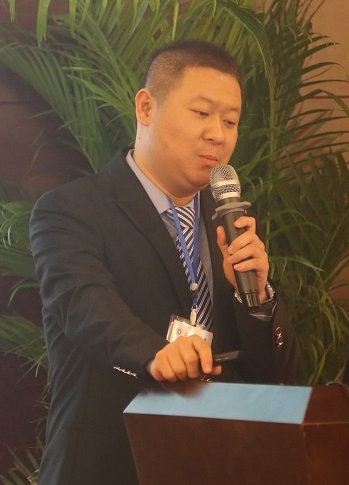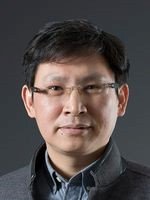

Prof. Lu Leng
Nanchang Hangkong University, China
BIO: LU LENG received his Ph.D degree from Southwest Jiaotong University, Chengdu, P. R. China, in 2012. He performed his postdoctoral research at Yonsei University, Seoul, South Korea, and Nanjing University of Aeronautics and Astronautics, Nanjing, P. R. China. He was a visiting scholar at West Virginia University, USA, and Yonsei University, South Korea. Currently, he is a full professor, the dean of Institute of Computer Vision, the office director of Jiangxi Province Key Laboratory of Image Processing and Pattern Recognition at Nanchang Hangkong University.
Prof. Leng has published more than 100 international journal and conference papers, including more than 70 SCI papers and three highly cited papers. He has been granted several scholarships and funding projects, including six projects supported by National Natural Science Foundation of China (NSFC). He serves as a reviewer of more than 100 international journals and conferences. His research interests include computer vision, biometric template protection, biometric recognition, medical image processing, data hiding, etc.
Prof. Leng was awarded Jiangxi Youth May-4th Medal, and is an outstanding representative of "Innovation Talent" of Jiangxi Enterprise in "Science and Technology China", "Jiangxi Hundred-Thousand-Ten-thousand Talent Project", "Jiangxi Voyage Project", etc.
The speech title: Changeable Biometric Template Generation in Secure Domain
Abstract: Biometric recognition is convenient and reliable, so it has been widely used for identification and verification. However, the biometric systems typically suffer from many serious problems of security and privacy. Thus changeable biometric template should be generated and recognized in secure domain. Changeable biometric template should meet four criteria, namely diversity, revocability / reusability, non-invertibility, accuracy performance. Unfortunately, it is highly challenging to meet all the criteria simultaneously. This keynote speech will introduce the advanced technologies of changeable biometric template generation in secure domain.

Prof. Jian Yao
Director of the Chinese Artificial Intelligence Society, China
BIO: Yao Jian, born in December 1975 in Lianyuan City, Hunan Province. Professor, doctoral supervisor, specially appointed professor of "Chutian Scholar" in Hubei Province, discipline leader of the School of Remote Sensing Information Engineering at Wuhan University, selected for the A-class Youth Project of the National Major Talent Project, Jiangxi Province's Double Thousand Plan, leading talent in the introduction of urgently needed and strategic talents in Changsha City, 3551 high-level talents in innovation and entrepreneurship in Wuhan City, professor of Optics Valley Industry in Wuhan City, 2019 student of Baidu Alpha College, discipline leader of the School of Artificial Intelligence at Guangdong Open University, director of the Artificial Intelligence Application Innovation Center at Guangdong Open University, director of the Research Institute of Gongdadi Innovation Technology (Shenzhen) Co., Ltd., part-time professor at Xiamen University of Aeronautics and Astronautics, visiting professor and doctoral supervisor in the field of engineering technology at Gele University in Thailand, Songhua Jiang Qianren is a specially appointed researcher at the Industrial Research Institute, the head of the Computer Vision and Remote Sensing Laboratory (WHU-CVRS Lab) at Wuhan University, and the director of the Innovation Research Center for 3D Big Data and Artificial Intelligence at Wuhan University. He is currently a director of the Chinese Artificial Intelligence Society and a member of the Computer Vision Professional Committee of the Chinese Computer Society (CCF), Member of the Imaging Detection and Perception Special Committee of the Chinese Society of Image Graphics, Member of the Machine Vision Special Committee of the Chinese Society of Image Graphics, Member of the 3D Vision Special Committee of the Chinese Society of Image Graphics, Member of the Big Data and Artificial Intelligence Working Committee of the Chinese Society of Surveying and Mapping, Member of the AEIC Academic Exchange Center Expert Committee, Member of the Expert Committee of the Shenzhen Artificial Intelligence Industry Association, Expert Committee of the Shannan Digital Economy (Informatization) Expert Committee, and Member of the Hubei Province and Wuhan New Overseas Chinese Professional Association. In April 2012, he was introduced as a discipline leader and has been teaching at the School of Remote Sensing Information Engineering at Wuhan University. In 2013, he was selected as a specially appointed professor of "Chu Tian Scholars" in Hubei Province. I have participated in multiple large-scale projects such as the EU's Sixth and Seventh Framework Plans, as well as cooperation projects with the International Atomic Energy Agency. In recent years, I have published more than 150 papers in international authoritative journals such as Pattern Recognition, Computer Vision&Image Understanding, International Journal of Robotics Research, IEEE Transactions on Image Processing, ISPRS Journal of Photography and Remote Sensing, IEEE Transactions on Geoscience and Remote Sensing (TGRS), and top international academic conferences such as CVPR, ECCV, and ICRA. I have applied for more than 80 national invention patents and granted more than 40 national invention patents. Served as a reviewer for international core journals and top international academic conferences in related fields for a long time. Since joining Wuhan University, we have established the Computer Vision and Remote Sensing Laboratory (WHU-CVRS Lab). Currently, our laboratory members include four domestic and foreign cooperative mentors, one postdoctoral fellow, and more than 30 doctoral and master's students. Since its establishment, I have led and participated in a series of national and provincial-level scientific research projects, including the National Key R&D Program (project leader), 973 Program (participation), National Natural Science Foundation of China General Project (leader) and Key Project (participation ranking second), Hubei Province Science and Technology Support Project (leader), Jiangsu Province Science and Technology Support Project (leader), as well as industry related enterprises (Tencent, Huawei, Alibaba, Didi, Changan Automobile, CNNC Group, Shenzhen Advanced Institute of Chinese Academy of Sciences, Lide Space, Jiwei Times, Wuhan Chizi Technology, Jiangsu Zhitu, Shenzhen Building Block Easy Building, Shenzhen Seeing Space, Gongdadi, Wuhan Light Buy Cloud, Hunan Qiaokang, Shunde Tianxingjian, and others have carried out a series of horizontal scientific and technological cooperation and student training cooperation. Currently, their main research directions include computer vision, artificial intelligence, robotics technology, high-precision maps, SLAM, navigation and positioning, autonomous driving, 3D technology, VR/AR, etc.

Prof. Philippe Fournier-Viger
IEEE Senior Member
Shenzhen University, China
BIO: Philippe Fournier-Viger (Ph.D) is a Canadian researcher, distinguished professor at Shenzhen University (China). Five years after completing his Ph.D., he came to China in 2015 and became full professor after receiving a talent title from the National Science Foundation of China. He has published more than 375 research papers related to data mining algorithms for complex data (sequences, graphs), intelligent systems and applications, which have received more than 13,000 citations. He is the founder of the popular SPMF data mining library, offering more than 250 algorithms to find patterns in data, cited in more than 1,000 research papers. He is former associate editor-in-chief of the Applied Intelligence journal and has been keynote speaker for over 20 international conferences and co-edited four books for Springer. He is a co-founder of the UDML, PMDB and MLiSE series of workshops held at the ICDM, PKDD, DASFAA and KDD conferences.